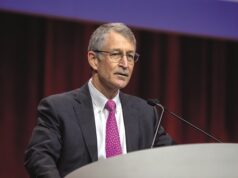
Transcatheter aortic valve implantation (TAVI) with the Acurate neo2 (Boston Scientific) device was associated with a lower prevalence of moderate or severe paravalvular aortic regurgitation (AR) and more patients with no or trace paravalvular AR compared with an earlier-generation device—a difference that was particularly evident in patients with heavy aortic valve calcification.
This was the conclusion of Andrea Scotti (Montefiore Medical Center, New York, USA), who delivered analysis of data from the NEOPRO and NEOPRO-2 registries during a late-breaking trial session at TVT 2022 (The Structural Heart Summit, 8–10 June, Chicago, USA), which was simultaneously published in EuroIntervention. The analysis looked at haemodynamic performance and clinical outcomes of TAVI with the latest-generation Acurate neo2 device.
The investigator-driven study used retrospective registry data from a total of 2,026 patients from 34 European centres comparing outcomes with the previous-generation Acurate neo valve from the NEOPRO Registry (1,263 patients from 18 centres) with those of the Acurate neo2 valve from the NEOPRO2 Registry (763 patients from 16 centres).
Key findings included a significant reduction in moderate or severe paravalvular aortic regurgitation (PAR) for the Acurate neo2 valve (2% vs. 5% with Acurate neo; p<0.001), contributing to the study meeting its primary endpoint with a higher VARC-3 intended valve performance (96% vs. 90%, p<0.001).
Investigators also found a significant reduction in mild PAR with patients receiving the Acurate neo2 valve, demonstrating a greater proportion of none/trace PAR (38% vs. 59% with Acurate neo, p<0.001). Furthermore, similar 30-day results (secondary endpoint) for VARC-3 technical success (Acurate neo2 93% vs. Acurate neo 91%, p=0.117), device success (Acurate neo2 84% vs. Acurate neo 81%, p=0.119) and one-year survival after TAVI (Acurate neo2 90% vs Acurate neo 87%; p=0.14), were also reported.
The analysis presented by Scotti at TVT 2022 follows closely behind the release of further data looking at Acurate neo2 at EuroPCR 2022 (17–20 May, Paris, France).
At the EuroPCR meeting Christopher Meduri (Karolinska Institut, Stockholm, Sweden) presented findings from the Neo-Align Study, a single-centre study of 170 patients who underwent TAVI with the Acurate neo2 valve using a novel implant technique to attempt commissural alignment of the prosthetic and native valves. The study demonstrated that commissural alignment can be achieved safely, effectively and quickly, with data demonstrating that 97% of patients had no significant misalignment (80% non; 17% mild; 1.2% moderate; 1.8% severe) and the average alignment time of 92 seconds had a minimal impact on procedure duration.
Post-procedure and 30-day safety events were consistent with expected TAVI complication rates, and small manipulations of the delivery system in the ascending aorta did not adversely impact safety outcomes, investigators reported.
Also at EuroPCR, Andrea Buono (Fondazione Poliambulanza Istituto Ospedaliero, Brescia, Italy) reported findings from the ITAL-neo registry, a two-arm, retrospective registry of 900 patients from 13 Italian centres, which it was reported, demonstrated superior performance of the Acurate neo2 valve compared with the previous-generation Acurate neo valve in minimising paravalvular leak (PVL).
The study, published simultaneously in JACC: Cardiovascular Interventions, met its primary endpoint with a three-fold reduction in more-than-mild paravalvular aortic regurgitation with the Acurate neo2 valve (11.2% for Acurate neo vs. 3.5% for Acurate neo2). The data also demonstrated a numerically higher in-hospital technical device success rate and improved success and safety outcomes at 90 days (secondary endpoints) for the Acurate neo2 valve.












